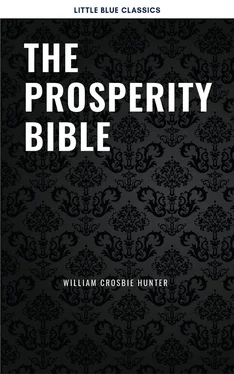When description is intended solely to give accurate information—as to delineate the appearance, not the technical construction, of the latest Zeppelin airship—it is called "scientific description," and is akin to exposition. When it is intended to present a free picture for the purpose of making a vivid impression, it is called "artistic description." With both of these the public speaker has to deal, but more frequently with the latter form. Rhetoricians make still further distinctions.
Methods of Description
In public speaking, description should be mainly by suggestion , not only because suggestive description is so much more compact and time-saving but because it is so vivid. Suggestive expressions connote more than they literally say—they suggest ideas and pictures to the mind of the hearer which supplement the direct words of the speaker. When Dickens, in his "Christmas Carol," says: "In came Mrs. Fezziwig, one vast substantial smile," our minds complete the picture so deftly begun—a much more effective process than that of a minutely detailed description because it leaves a unified, vivid impression, and that is what we need. Here is a present-day bit of suggestion: "General Trinkle was a gnarly oak of a man—rough, solid, and safe; you always knew where to find him." Dickens presents Miss Peecher as: "A little pin-cushion, a little housewife, a little book, a little work-box, a little set of tables and weights and measures, and a little woman all in one." In his "Knickerbocker's" "History of New York," Irving portrays Wouter van Twiller as "a robustious beer-barrel, standing on skids."
Whatever forms of description you neglect, be sure to master the art of suggestion.
Description may be by simple hint. Lowell notes a happy instance of this sort of picturing by intimation when he says of Chaucer: "Sometimes he describes amply by the merest hint, as where the Friar, before setting himself down, drives away the cat. We know without need of more words that he has chosen the snuggest corner."
Description may depict a thing by its effects. "When the spectator's eye is dazzled, and he shades it," says Mozley in his "Essays," "we form the idea of a splendid object; when his face turns pale, of a horrible one; from his quick wonder and admiration we form the idea of great beauty; from his silent awe, of great majesty."
Brief description may be by epithet. "Blue-eyed," "white-armed," "laughter-loving," are now conventional compounds, but they were fresh enough when Homer first conjoined them. The centuries have not yet improved upon "Wheels round, brazen, eight-spoked," or "Shields smooth, beautiful, brazen, well-hammered." Observe the effective use of epithet in Will Levington Comfort's "The Fighting Death," when he speaks of soldiers in a Philippine skirmish as being "leeched against a rock."
Description uses figures of speech. Any advanced rhetoric will discuss their forms and give examples for guidance. This matter is most important, be assured. A brilliant yet carefully restrained figurative style, a style marked by brief, pungent, witty, and humorous comparisons and characterizations, is a wonderful resource for all kinds of platform work.
Description may be direct. This statement is plain enough without exposition. Use your own judgment as to whether in picturing you had better proceed from a general view to the details, or first give the details and thus build up the general picture, but by all means BE BRIEF.
Note the vivid compactness of these delineations from Washington Irving's "Knickerbocker:"
He was a short, square, brawny old gentleman, with a double chin, a mastiff mouth, and a broad copper nose, which was supposed in those days to have acquired its fiery hue from the constant neighborhood of his tobacco pipe.
He was exactly five feet six inches in height, and six feet five inches in circumference. His head was a perfect sphere, and of such stupendous dimensions, that Dame Nature, with all her sex's ingenuity, would have been puzzled to construct a neck capable of supporting it; wherefore she wisely declined the attempt, and settled it firmly on the top of his backbone, just between the shoulders. His body was of an oblong form, particularly capacious at bottom; which was wisely ordered by Providence, seeing that he was a man of sedentary habits, and very averse to the idle labor of walking.
The foregoing is too long for the platform, but it is so good-humored, so full of delightful exaggeration, that it may well serve as a model of humorous character picturing, for here one inevitably sees the inner man in the outer.
Direct description for platform use may be made vivid by the sparing use of the "historical present." The following dramatic passage, accompanied by the most lively action, has lingered in the mind for thirty years after hearing Dr. T. De Witt Talmage lecture on "Big Blunders." The crack of the bat sounds clear even today:
Get ready the bats and take your positions. Now, give us the ball. Too low. Don't strike. Too high. Don't strike. There it comes like lightning. Strike! Away it soars! Higher! Higher! Run! Another base! Faster! Faster! Good! All around at one stroke!
Observe the remarkable way in which the lecturer fused speaker, audience, spectators, and players into one excited, ecstatic whole—just as you have found yourself starting forward in your seat at the delivery of the ball with "three on and two down" in the ninth inning. Notice, too, how—perhaps unconsciously—Talmage painted the scene in Homer's characteristic style: not as having already happened, but as happening before your eyes.
If you have attended many travel talks you must have been impressed by the painful extremes to which the lecturers go—with a few notable exceptions, their language is either over-ornate or crude. If you would learn the power of words to make scenery, yes, even houses, palpitate with poetry and human appeal, read Lafcadio Hearn, Robert Louis Stevenson, Pierre Loti, and Edmondo De Amicis.
Blue-distant, a mountain of carven stone appeared before them,—the Temple, lifting to heaven its wilderness of chiseled pinnacles, flinging to the sky the golden spray of its decoration.
–Lafcadio Hearn, Chinese Ghosts .
The stars were clear, colored, and jewel-like, but not frosty. A faint silvery vapour stood for the Milky Way. All around me the black fir-points stood upright and stock-still. By the whiteness of the pack-saddle I could see Modestine walking round and round at the length of her tether; I could hear her steadily munching at the sward; but there was not another sound save the indescribable quiet talk of the runnel over the stones.
–Robert Louis Stevenson, Travels with a Donkey .
It was full autumn now, late autumn—with the nightfalls gloomy, and all things growing dark early in the old cottage, and all the Breton land looking sombre, too. The very days seemed but twilight; immeasurable clouds, slowly passing, would suddenly bring darkness at broad noon. The wind moaned constantly—it was like the sound of a great cathedral organ at a distance, but playing profane airs, or despairing dirges; at other times it would come close to the door, and lift up a howl like wild beasts.—Pierre Loti, An Iceland Fisherman .
I see the great refectory, where a battalion might have drilled; I see the long tables, the five hundred heads bent above the plates, the rapid motion of five hundred forks, of a thousand hands, and sixteen thousand teeth; the swarm of servants running here and there, called to, scolded, hurried, on every side at once; I hear the clatter of dishes, the deafening noise, the voices choked with food crying out: "Bread—bread!" and I feel once more the formidable appetite, the herculean strength of jaw, the exuberant life and spirits of those far-off days.
Читать дальше












